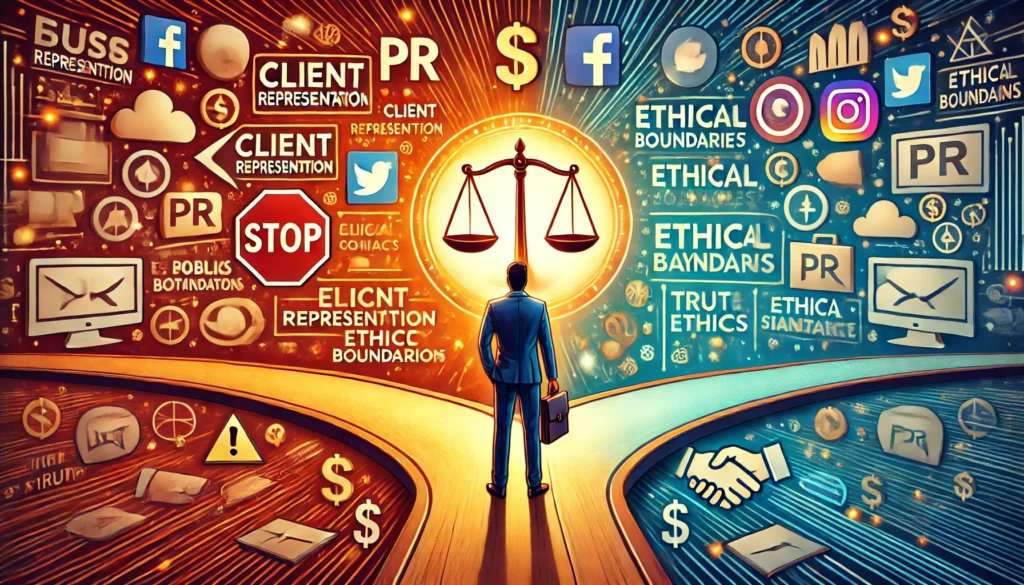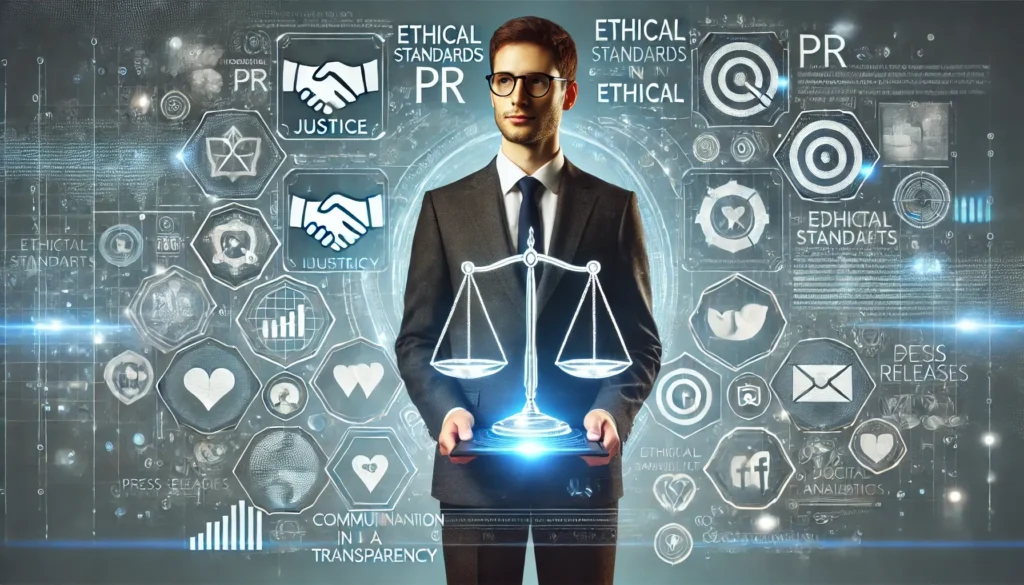In the ever-evolving world of public relations (PR), the role of a consultant or agency often falls under scrutiny. The balancing act between advocating for a client and maintaining ethical integrity is a delicate one, fraught with potential conflicts of interest. Public relations professionals must manage both the expectations of their clients and their responsibility to the consumer public. Leonardo Lombardo, a seasoned PR consultant and marketing entrepreneur, has witnessed these ethical challenges firsthand and offers a candid discussion on where the profession must draw the line.
As businesses increasingly seek to sway public opinion through strategic messaging, Lombardo highlights the need for transparency and ethical considerations in public relations. He has spent years advising clients across industries, from startups to multinational corporations. Yet, he recognizes that the line between persuasive communication and misleading spin is often blurred, particularly when clients demand unverified claims and exaggerated representations of their products or services.
In this article, we explore Leonardo Lombardo’s perspective on navigating the ethical difficulties inherent in public relations, the struggle to define boundaries with clients, and the importance of prioritizing public trust over profit.
Navigating Ethical Dilemmas in Public Relations: Insights from Leonardo Lombardo is an original (EmergingEnterPriseNews) article.
The Ethical Tightrope: Balancing Client Demands with Public Integrity
“Public relations is, at its core, about building trust,” Leonardo Lombardo asserts. “When we cross the line into exaggeration or misrepresentation, we betray that trust, not just with the public but within the profession itself.”
Lombardo explains that PR professionals often face pressure from clients to amplify positive aspects of their brands, products, or personalities, even if these claims are not entirely verifiable. While public relations is a powerful tool for shaping narratives, he believes that ethical boundaries must be clearly defined to avoid misleading the public.
“Clients come to us to tell their story,” Lombardo continues. “But it becomes an issue when they want us to embellish that story beyond what’s real. Our job is to ensure their message is truthful and transparent, not to manufacture a façade.”
Lombardo emphasizes that the push for exaggerated claims often stems from competitive pressures. Clients want to stand out, and in doing so, they may request PR strategies that tread a fine line between enthusiastic promotion and falsehood. For public relations professionals, this raises a crucial question: how far is too far?

Leonardo Lombardo on Defining the Ethical Boundaries of Client Representation
According to Lombardo, the ethical boundaries in public relations should be defined not just by legal constraints but also by a deep-seated commitment to integrity. He points to several high-profile scandals in which PR firms were implicated for spreading misinformation or covering up negative aspects of their clients. These cases have tarnished the reputation of the entire profession, creating what he refers to as an “ironic paradox.”
“The irony of public relations is that we are responsible for managing reputations, yet our own reputation as professionals has often been questioned due to ‘spin doctoring’ tactics,” Lombardo observes. “If we’re willing to mislead the public on behalf of our clients, what does that say about our own credibility?”
Lombardo advocates for PR professionals to adopt a code of ethics that prioritizes honesty over profitability. He suggests that the industry’s long-term success hinges on maintaining public trust and ensuring that clients’ narratives are grounded in fact. However, he acknowledges that this is easier said than done, especially when faced with clients who are more concerned about short-term gains than long-term integrity.
“At the end of the day, we’re faced with a choice: do we represent the highest bidder, regardless of their ethics, or do we stand firm on principles?” Lombardo asks. “I believe it’s possible to do both, but it requires a strong commitment to ethical boundaries from the outset.”

The Challenge of “Black Sheep” Clients: When Representation Crosses the Line
One of the greatest challenges Leonardo Lombardo has encountered in his career is the decision to take on—or reject—what he calls “black sheep” clients. These clients may have questionable practices or overly aggressive marketing strategies that push the limits of ethical communication.
“Every PR professional has encountered a ‘black sheep’ client at some point,” Lombardo says. “They’re the ones who want you to bend the truth or hide the facts in ways that make you uncomfortable. The temptation is real, especially when the client offers a significant financial reward.”
Lombardo recalls instances where he has had to walk away from potential clients because they were unwilling to adhere to ethical standards. While this can be a difficult decision, he stresses that it is necessary for preserving both personal and professional integrity.
“It’s not easy to say no to a lucrative deal, but sometimes it’s the only choice,” Lombardo explains. “If a client is demanding that you compromise your values or engage in practices that could harm the public, you have to ask yourself whether it’s worth the risk—not just to your own reputation, but to the profession as a whole.”
Lombardo’s Approach to Public Safety and Client Representation
Lombardo is particularly concerned about the potential impact of misleading PR campaigns on public safety. He points to several examples where exaggerated health claims or misleading product information have caused harm to consumers. In these cases, the PR firm becomes complicit in the fallout, even if they were not directly responsible for the product or service in question.
“Public relations is more than just managing perceptions—it’s about protecting the public from misinformation,” Lombardo asserts. “When we exaggerate claims or hide negative aspects of a product, we’re putting people at risk. It’s our duty to ensure that the information we’re promoting is accurate and verified.”
Lombardo believes that PR professionals have a responsibility not only to their clients but also to the public. This dual responsibility can be difficult to navigate, especially when clients pressure PR firms to prioritize their own interests over public well-being.
“I’ve had clients tell me, ‘It’s not your job to worry about the public, that’s our job.’ But I disagree,” Lombardo says. “As PR professionals, we have a role to play in safeguarding public trust. We can’t just blindly follow our clients’ wishes if it means putting people in harm’s way.”
The Future of Public Relations: Building a More Ethical Industry
Looking ahead, Lombardo envisions a future where the public relations industry takes a more proactive role in self-regulation and ethical advocacy. He believes that PR firms should be at the forefront of promoting transparency, honesty, and accountability, both in their dealings with clients and in the broader public discourse.
“Public relations can—and should—be a force for good,” Lombardo says. “We have the power to shape narratives in ways that build trust and foster positive change. But that only happens if we’re committed to ethical standards and aren’t willing to compromise for the sake of profit.”
Lombardo advocates for stronger industry standards that would hold PR firms accountable for misleading or unethical practices. He also suggests that PR professionals should take a more active role in educating their clients about the long-term benefits of transparency and integrity.
“Many clients believe that the best representation—and the best reputation—should go to the highest bidder,” Lombardo observes. “But that’s a short-sighted approach. In the long run, honesty and ethical communication are what truly build lasting trust with the public.”

Leonardo Lombardo’s Proposed Ethical Guidelines for PR Professionals
Lombardo offers several key ethical guidelines that he believes all PR professionals should follow to maintain integrity in their work:
1. Prioritize transparency: “If you can’t verify a claim, don’t make it. Ensure that all the information you’re sharing is truthful and backed by evidence.”
2. Educate clients on ethical standards: “Clients often don’t understand the long-term damage that can come from misleading the public. It’s our job to educate them on why ethical communication matters.”
3. Set boundaries from the outset: “Before taking on a client, make it clear that you won’t engage in unethical practices. If they push you to cross that line, walk away.”
4. Consider the public’s well-being: “Always ask yourself: ‘Is this in the best interest of the public?’ If the answer is no, rethink your strategy.”
5. Hold yourself and your firm accountable: “If something feels wrong, trust your instincts. Don’t compromise your integrity for the sake of a fee or a paycheck.”
Lombardo’s Call for a More Ethical PR Profession
Leonardo Lombardo’s insights into the ethical challenges of public relations provide a roadmap for professionals who want to navigate the industry with integrity. His emphasis on transparency, public safety, and the long-term benefits of ethical communication serves as a guiding principle for PR consultants and marketing entrepreneurs alike.
In a profession often associated with spin and manipulation, Lombardo calls for a shift in focus toward honesty and accountability. As public relations continues to evolve, his message is clear: ethical boundaries are not just a matter of personal integrity—they are essential to the survival and reputation of the industry itself.
“At the end of the day, public relations is about trust,” Lombardo concludes. “If we lose that, we lose everything.”
By standing firm on ethical principles and resisting the temptation to mislead the public, PR professionals can help rebuild trust—not just with clients, but with society as a whole.
